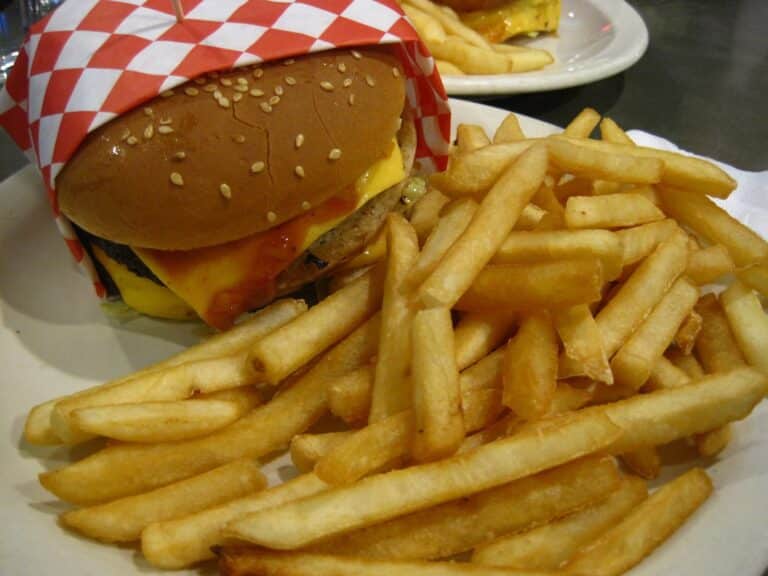TV junk food advertising will be banned before 9pm from next year, the government has confirmed.
This will be accompanied by a total ban on paid-for online advertising for junk food, under plans to tackle childhood obesity.
The new rules deliver on a Labour manifesto commitment to implement the restrictions, with the timeline set out to “provide clarity” for businesses, according to health minister Andrew Gwynne. The ban had been long-mooted by the previous Conservative government, but twice pushed back under fast-food industry pressure.
In a written ministerial statement confirming the plans, he said: “These restrictions will help protect children from being exposed to advertising of less healthy food and drinks, which evidence shows influences their dietary preferences from a young age.”
Gwynne was also adamant that Labour would stick to its timeline: “This provides the clarity that businesses have been calling for and will support them to prepare for the restrictions coming into force across the UK on 1 October 2025,” he said.
He added that more than one in five children in England are overweight or living with obesity by the time they start primary school, and this rises to more than one third by the time they leave.
“We want to tackle the problem head-on on and that includes implementing the restrictions on junk food advertising on TV and online without further delay,” he said.
Local authorities including York and Sheffield have already announced or instituted plans to ban junk food advertising within their jurrisdiction, and the government’s new plans also include a ban on online ads.
A four-week consultation will aim to clarify how the regulations will apply to Internet Protocol Television (IPTV), which delivers TV live on the web.
Last year a survey found eight out of 10 adults support a ban on advertising unhealthy food to children on TV and online.
The British Heart Foundation wants the government to go further and expand the ban to things like billboards, radio advertising and sports sponsorship, alongside a package of measures such as a salt and sugar tax, although these are not believed to be part of Labour’s current plans.
Holly Hall from Manchester’s Brazil Street, which has handled creative, planning and buying for companies including Bahlsen, Co-op Travel and Travel Supermarket, said: “This is a very uncertain time for many brands within this space – whilst it’s been muted for a number of years now & delayed twice before, it’s looking increasingly likely that there is no budging on it.
“I think naturally, at the beginning, we may see a lot of spend being diverted out of paid media solutions to other business areas, focusing on owned, earned, whilst everyone works out how to navigate the new rules. But soon enough, brands will start to find ways around it, similar to how Gambling brands operate now. TV will take a hit for sure with post-watershed introduction, but again, I believe at first this will be a big change, but one that will soon just be the norm.
“It’s going to be vital that advertisers make the very most of this time between now and when the ban will be introduced to carry on as normal – maximising the channels which will become restricted whilst they still can – TV, Digital, Social – But in the same sense, it’s important brands also use this time and opportunity to test new channels that won’t be affected – OOH, Radio, Cinema, Press – so by the time October 2025 comes around, they have some key learnings they can take forward.”
A spokesperson for the Advertising Association added: “We note that the Government has committed to delivering the policy announced under the previous administration in 2022. Although the policy is not new, the advertising industry has long-awaited clarity over the restrictions and we welcome the Minister providing more information in his statement. It is vital that we now have the final guidance and legislation published as soon as possible to give certainty to business.
“While the evidence shows that advertising bans will have little effect on childhood obesity, the confirmation of these restrictions will help bring the certainty that our sector has been asking for ahead of their implementation in October 2025.”
Al Marchant, CEO of Manchester agency Meanwhile, which has worked alongside names such as Coventry Building Society, Children in Need and Chester Zoo added: “So the Government are finally going to ban TV ads for junk food pre-watershed, and online altogether. Is it going to affect revenues in the creative and media industries? Yeah, probably. Is it going to affect revenues in the food & drink industries? No doubt. Is it the right thing to do? As a parent of two young kids: damn f***ing right it is.
“This feels like such a no-brainer, it shouldn’t even be questioned. Let’s get it done, and not forget there are things more important than money (not to mention advertising).”
KOMI founder Robin T Williams, however, was less convinced of the effect a TV ban may have: “The ban will not impact large chains such as McDonalds, KFC and Domino’s and it also will not impact independent fast food stores either. “
Williams’ analysis is that the big corporates have the budget to spend elsewhere, while the independents don’t advertise on TV anyway: “All it is going to do is benefit social media advertising companies, as if you want to reach children you will go to TikTok,” he said.
He added that he has noticed a decrease in junk food adverts on TV, but “Uber, JustEat and Deliveroo send you notification to push you into the idea of McDonalds and KFC during the day, both weekdays and weekends. This will only encourage fast food companies to put more money into their apps, advertising on there and also notifying consumers more.”













